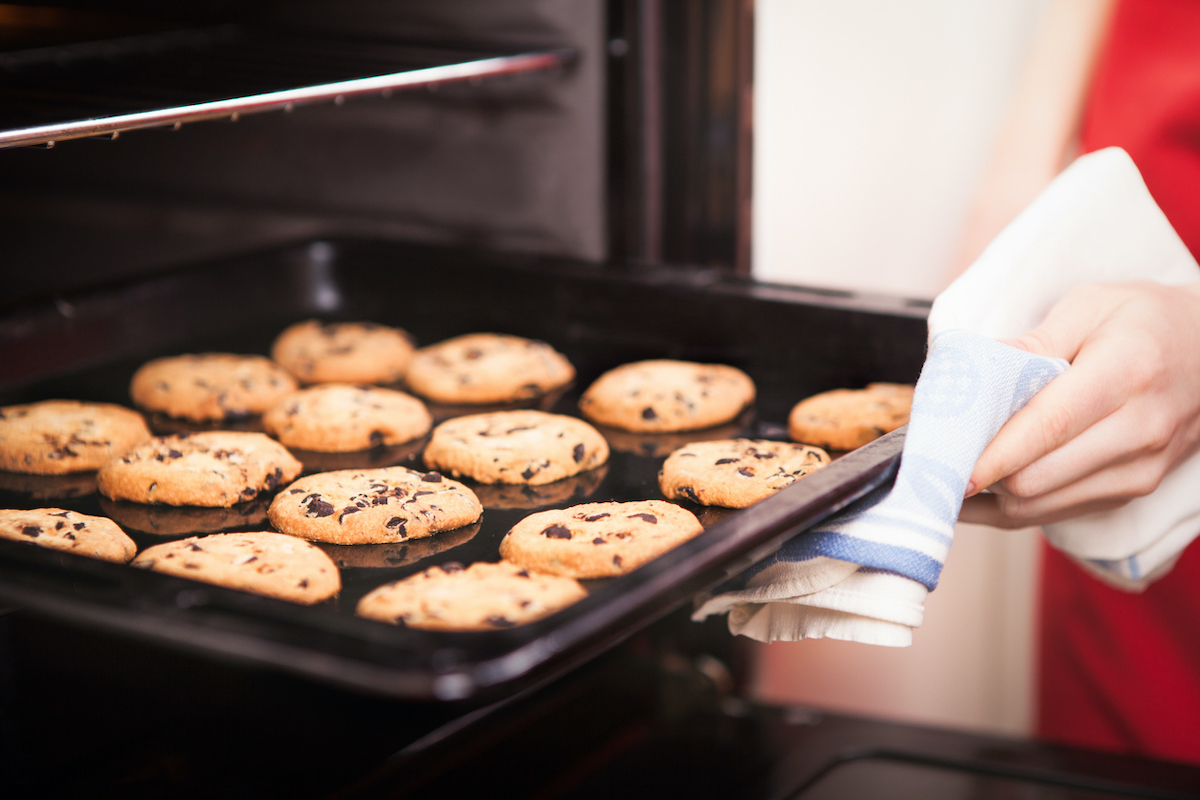

We may earn revenue from the products available on this page and participate in affiliate programs. Learn More ›
There’s nothing quite as comforting as whipping up a batch of cookies. Once the fun is over, sometimes you’re left with sheet pans lined with browned grease, especially if you left the cookies in the oven a bit too long or have been a little lax about getting those pans completely spick and span. Luckily, there are a few easy solutions for banishing brown, burnt gunk from cookie sheets.
Before You Begin
Before learning the different methods for how to clean baking sheets, it’s important to determine what yours are made of. These pans come in a few different materials, each with its own advantages and disadvantages:
- Aluminum cookie sheets are lightweight and affordable, but they tend to warp easily when exposed to high temperatures.
- Nonstick cookie sheets are an ideal choice for those looking for easy release of baked goods without the need for greasing or parchment paper. However, these types of sheets can scratch easily, which reduces their nonstick properties over time.
- Aluminized steel cookie sheets, yet another option, have excellent heat conductivity and durability compared to other materials.
Once you know what kinds of baking sheets you have, you’ll know which of the following methods is best for your gear. As you’ll see below, some of these methods will not work on certain types of pans (don’t use ammonia on nonstick or aluminum sheets, for example).
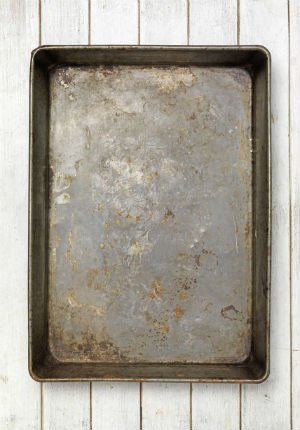
How to Clean Cookie Sheets With Baking Soda and Peroxide
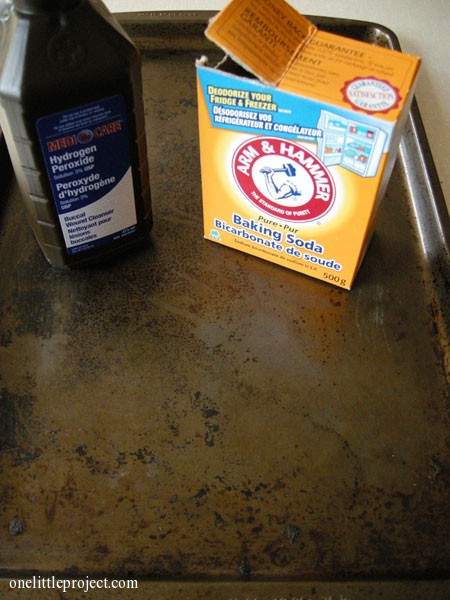
You can remove baked-on grease and gunk on your cookie sheets with two common household ingredients: baking soda and hydrogen peroxide. Hydrogen peroxide is a natural cleaning agent that, when mixed with baking soda, alkalizes to loosen gunk the way other cleaners can’t. While the entire process of cleaning pans with baking soda takes a little more than 2 hours, expect longer soaking time for seriously greasy pans.
Supplies
Baking soda
Hydrogen peroxide
Cleaning towels
Household sponge
1. Pour about ¼ cup baking soda into any type of bowl, then slowly add 2 to 3 tablespoons of hydrogen peroxide, stirring as you go, until a thick paste forms. If you add too much liquid, thicken the mixture with some baking soda.
2. Place the dirty cookie sheet flat in the sink or a washtub, or simply place it on a large towel on your kitchen counter.
3. Generously spoon the baking soda-hydrogen peroxide paste onto the baking sheet, covering it completely. There’s no need to scrub or work the paste into the pan.
4. Let the paste-covered pan sit for about 2 hours. (Note: Especially dirty pans may require more soaking time to loosen the grime.)
5. Dampen a household sponge with warm water. (Do not use an abrasive pad, which can scratch nonstick surfaces.) Gently scrub the pan, applying extra elbow grease to the tough spots, and rinse with warm water.
6. Dry the pan thoroughly. This step is important: Skip it, and you run the risk of rust or corrosion.
7. If the back of the cookie sheet is also stained, repeat all steps on the other side.
Now you’re ready to bake some cookies! To keep your pans in tip-top condition going forward, always set a timer when baking, and consider using parchment paper rather than a thin coat of cooking spray or grease when baking. Parchment won’t leave behind any sticky, burnt-on residue.
How to Clean Cookie Sheets With Baking Soda
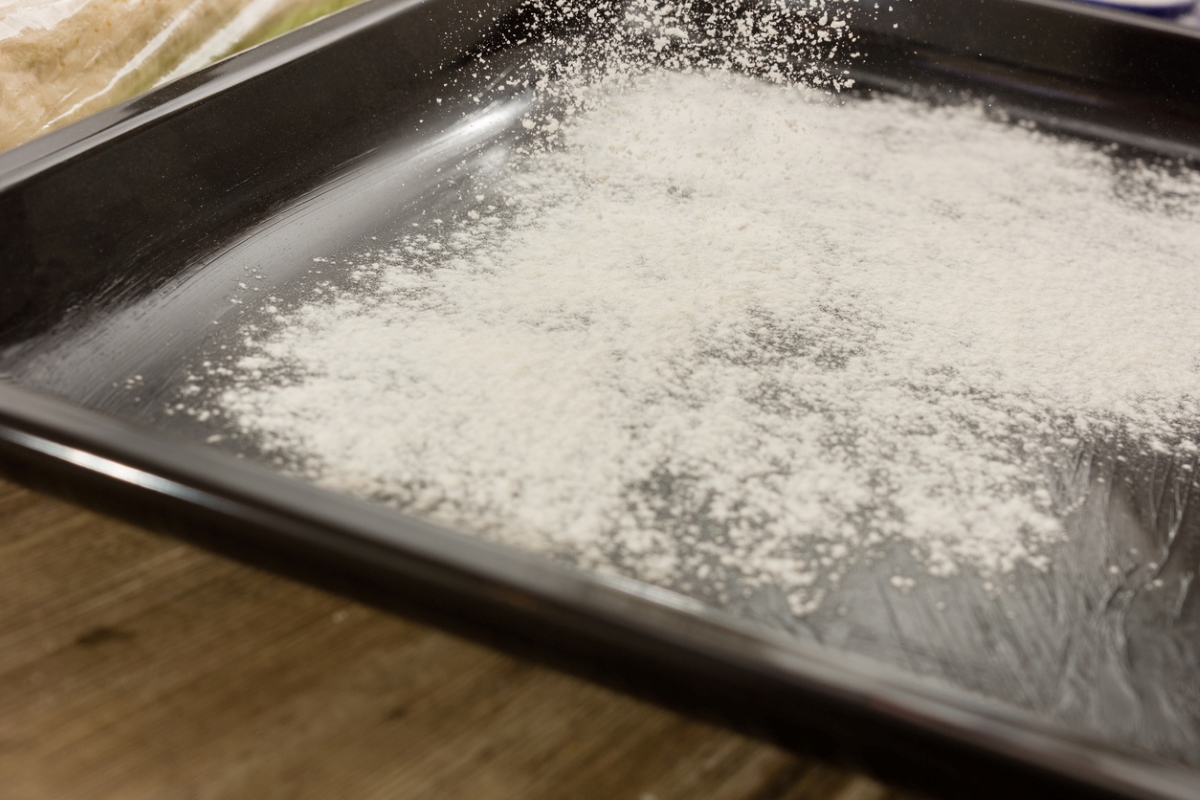
Baking soda is an effective natural cleaner that can not only help you get your cookie sheets sparkling, but also help deodorize them. It’s safe for use on all types of materials, including nonstick surfaces and aluminum.
Supplies
Baking soda
Microfiber cloths
Dish soap
1. Fill the cookie sheet with boiling water and add a couple of tablespoons of baking soda. If needed, add a few drops of dish soap to the mix to cut through grease and oil buildup.
2. Soak the cookie sheet in this solution for an hour or more, depending on how stubborn the residue is. Soaking gives the baking soda time to loosen the food particles from the surface.
3. Wash the cookie sheet with dish soap, using a microfiber cloth.
4. Dry thoroughly.
How to Clean Cookie Sheets With Baking Soda and Vinegar
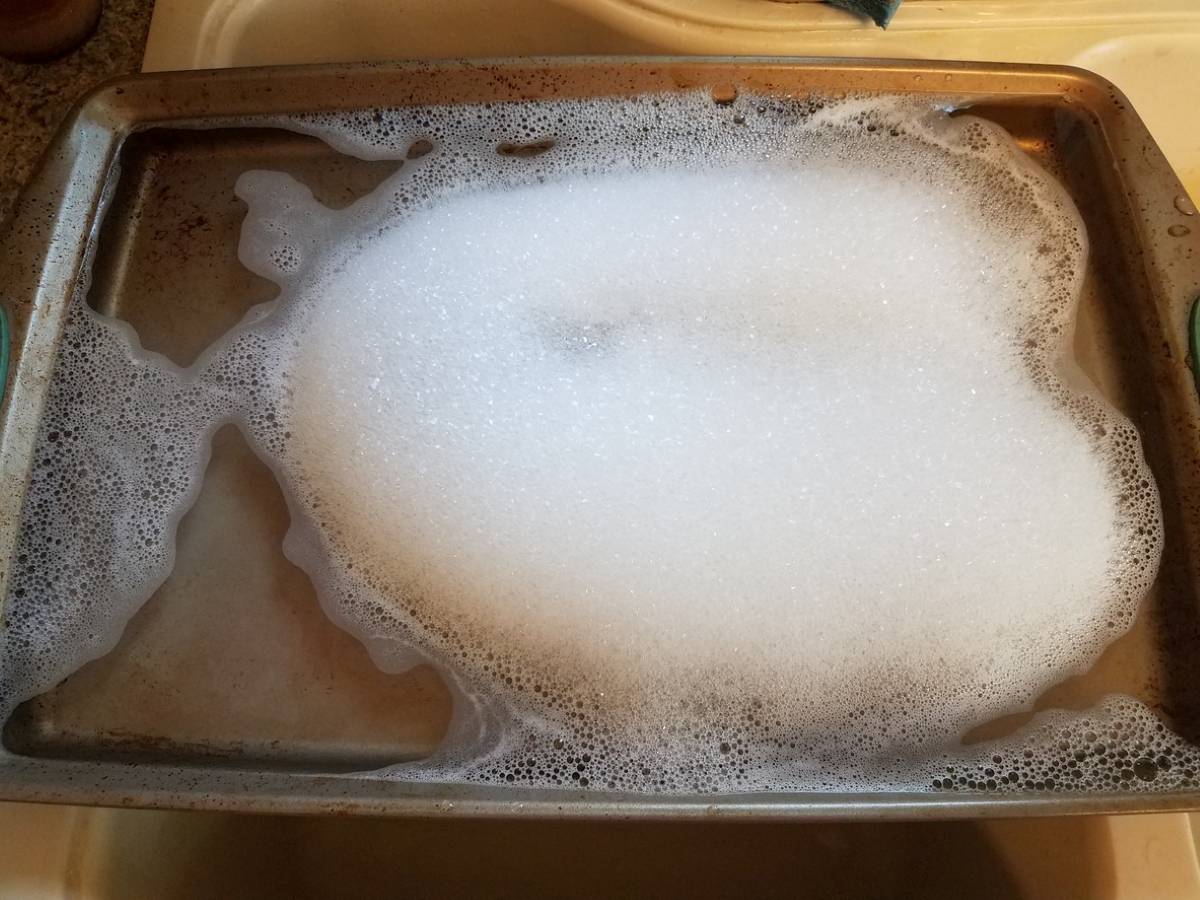
The best way to clean cookie sheets is with a combination of baking soda and vinegar. While baking soda alone is an effective cleaning agent, pairing it with vinegar amps up its cleaning power. Because vinegar is so acidic, it causes a chemical reaction when paired with baking soda that creates a foaming effect.
This method is safe to use on both standard and nonstick baking sheets. That said, this method involves soaking the sheet in water, so avoid using it for insulated cookie sheets. These sheets have an air chamber sandwiched between layers of aluminum, and soaking can let water into the gap, affecting the cookie sheet’s performance.
Supplies
Baking soda
White vinegar
Dish soap
Microfiber cloths
1. Fill your sink with warm water and add half a cup each of baking soda and white vinegar.
2. Place the cookie sheet in the sink and allow it to soak for 30 to 60 minutes.
3. Using dish soap and a wet cloth, scrub away at any remaining particles or residue on the cookie sheet. If cleaning nonstick cookie sheets, avoid scrubbing too vigorously.
4. Dry thoroughly.
How to Clean Cookie Sheets With Cream of Tartar
Cream of tartar is a by-product of the winemaking industry that’s used in baking, but it’s also an effective cleaning agent when it’s used with washing soda. This method is safe for all types of baking sheets, regardless of the material. Washing soda can cause skin irritation, so wear gloves when cleaning with it.
Supplies
Cream of tartar
Washing soda
Microfiber cloths
1. Create a paste by mixing the washing soda and cream of tartar with hot water.
2. Apply the paste evenly to the cookie sheet
3. Allow the mixture to sit for up to 8 hours. The longer it sits, the more effective it will be.
4. Rinse the pan and gently scrub it using a microfiber cloth.
5. Dry thoroughly.
RELATED: Solved! What is the Drawer Under the Oven For?
How to Clean Cookie Sheets With Ammonia
For ultratough staining, ammonia may be the most effective solution. It’s important to note that while this method is effective for cleaning cookie sheets made from aluminized steel, it may damage nonstick and aluminum baking pans. Ammonia is a harsh chemical that can cause skin and eye irritation, so be sure to wear protective clothing while handling it.
Supplies
Ammonia
Garbage bags
Steel wool
1. Place the cookie sheet in a large garbage bag with 1/2 cup of ammonia.
2. Seal the bag and bring it outdoors. Place it in the sun for 24 hours.
3. While wearing a protective mask and gloves, open the bag and remove the cookie sheet.
4. Use steel wool to scrub the pan clean and rinse with cold water.
5. Dry thoroughly.
Final Thoughts
The cleaning methods above should make your cookie sheets look brand-new again. To prevent your cookie sheets from becoming dirty in the first place, always use parchment paper or a silicone baking mat. Remember that regular maintenance will help keep your pans looking as good as new for longer, so don’t forget to clean them after each use. With these tips, you’ll never have to worry about grimy, dull-looking cookie sheets again. Now get baking!
